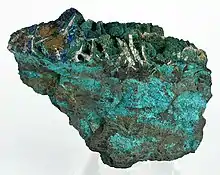| Utahite | |
|---|---|
 Utahite and Jarosite | |
| General | |
| Category | Tellurate minerals |
| Formula (repeating unit) | Cu5Zn3(Te6+O4)4(OH)8•7H2O |
| IMA symbol | Uta[1] |
| Strunz classification | 7.DE.25 |
| Crystal system | Triclinic Unknown space group |
| Unit cell | a = 8.794 Å, b = 9.996 Å c = 5.66 Å; α = 104.1° β = 90.066°, γ = 96.3333°; Z = 1 |
| Identification | |
| Formula mass | 1,542.46 g/mol |
| Color | Pale blue, greenish blue |
| Crystal habit | Prismatic thin tabular to bladed crystals; as sheaves and bow tielike clusters |
| Cleavage | none |
| Fracture | Brittle - uneven |
| Mohs scale hardness | 4-5 |
| Luster | Vitreous to pearly |
| Streak | Pale blue |
| Diaphaneity | Translucent |
| Specific gravity | 5.33 |
| Optical properties | Biaxial |
| Refractive index | nα = 1.830 - 1.840 nβ = 1.830 - 1.900 nγ = 1.880 - 1.900 |
| Birefringence | δ = 0.050 - 0.060 |
| Dispersion | Strong |
| References | [2][3][4] |
Utahite is an extremely rare secondary copper zinc tellurate mineral found as a product of oxidation. Its chemical formula is Cu5Zn3(Te6+O4)4(OH)8•7H2O.
It was first described in 1997 for an occurrence in the Centennial Eureka mine, one mile southeast of Eureka, Tintic District, Juab County, Utah, US (type locality). The discovery site was a mine dump of a hydrothermal ore deposit where it occurs with cesbronite and quartz.[4] It has also been reported from the Empire Mine in the Tombstone District of Cochise County, Arizona.[3]
References
- ↑ Warr, L.N. (2021). "IMA–CNMNC approved mineral symbols". Mineralogical Magazine. 85 (3): 291–320. Bibcode:2021MinM...85..291W. doi:10.1180/mgm.2021.43. S2CID 235729616.
- ↑ Utahite, Webmineral.com
- 1 2 Utahite, Mindat.org
- 1 2 Handbook of Mineralogy
This article is issued from Wikipedia. The text is licensed under Creative Commons - Attribution - Sharealike. Additional terms may apply for the media files.